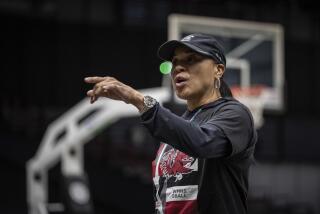As Gap Between Rich and Poor Grows, Resentment Doesn’t
- Share via
WASHINGTON — A 1999 Times poll found that nearly 60% of Californians who described themselves as working or lower class expected they would be able to move up the economic ladder. Many at the bottom have, in fact, been making progress during this long expansion. This may be one reason why inequality, a hot topic for politicians and journalists in the 1980s and early 1990s, is getting less play these days. When people at the bottom and top are gaining ground, inequality is less potent. But there are other reasons for the current apathy about inequality.
In 1992, Bill Clinton began his first presidential run by criticizing executive pay and perks to draw attention to the growing income gap between rich and poor. In the last eight years, however, the Democratic Party has grown much closer to Wall Street, and criticism of the money men there may be less vocal as a result. Today, Democratic politicians talk about the digital divide, often as a surrogate for the old discussions of income inequality. This new formulation is less likely to irritate allies and funders on Wall Street than criticism of salaries and stock options.
The public may also feel more comfortable with the newly rich than in the past. In their 1996 book, “The Millionaire Next Door,” authors Thomas Stanley and William Danko drew a survey-based portrait of millionaire Mainstreeters who blended easily into their communities. Stephen M. Case of America Online, who wears khakis and drives a VW Bug and an SUV, fits the profile. For many of the new cyberbillionaires, gray flannel suits have given way to Gap casual. This is a definite change. Though many who served in the Reagan and Bush administrations were also self-made men, their upscale tastes ran to expensive designer labels that set them apart from average Americans and may have drawn more attention to the gap between rich and poor.
As the United States has become richer, there has also been a corresponding rise in social equality, and this, too, may be taking some of the sting out of growing income inequality. In 1997, when Fendi introduced its wildly popular baguette, the slim shoulder bag designed to be carried under the arm like a loaf of French bread, the price tag could be as high as $5,100. But, today, Coach offers a copy for $198, and the younger, hipper Bebe stores have one for $49. The market’s impressive ability to reproduce high-end consumer goods for the masses has democratized status. Here’s another example: In 1998, Americans 30 years or older were asked how a family with a swimming pool would have been viewed when they were growing up. Responding to that poll, 58% said the family would have been considered “well above average” in terms of wealth. But only 14% said a family with a pool would be considered “well above average” today.
Even before this economic boom, most Americans were reasonably satisfied with what they had, and nearly all recognized gains from their parents’ time. Virtually every polling question from the past quarter-century shows that solid majorities feel better off than their parents in terms of opportunity, preparation to get ahead, standard of living, income, homes and possessions. This dampens resentment against the rich, too.
A more generally favorable climate toward big business also helps explain the reduced journalistic coverage of inequality. Financial writer John Steele Gordon recently noted that capitalism’s history is no longer being written by its enemies. In recent years, he said, there have been an “increasing number of serious rigorous biographies in which businessmen are not mere automatons of greed but live human beings.” Literary critic Jonathan Yardley recently described our time as one in which “big business and those who run it are esteemed.” In part because the federal government has performed so poorly in the minds of many Americans, businessmen who produce wealth look good by comparison. Most Americans don’t think the prosperity the country enjoys today comes from Washington. In several recent polls, more people have said that they would like their children to grow up to be like Bill Gates than Clinton.
Yet another explanation for waning coverage of the income gap may come from the economic profession itself. While nearly all economists who study income inequality agree it is real and growing, there is uncertainty about how it can best be addressed. In the 1970s, economists worried whether young people seeking higher education would receive sufficient rewards in the marketplace to justify the high cost of schooling. Today, the rewards of additional schooling have been so great that some, particularly males with a high-school education or less, are farther behind that in the past. Economists also know that the gap between rich and poor is exacerbated when people marry people like themselves. Inequality is measured in terms of family, not individual, income, and the distance between high-earner two-income families at the top and low-earner two-income families at the bottom is greater than in the past. Economists are more aware than a decade ago about how much natural movement there is up and down the economic ladder over time, and this knowledge contributes to uncertainty about what can be done about it.
In 1992, the New York Times ran a front-page story arguing that “the richest 1% of American families appears to have reaped most of the gains from the prosperity of the last decade and a half.” The article ricocheted through civic discourse for weeks. And that same story could be written today. But one reason it hasn’t may be that many in the media, like those in country as a whole, have found themselves better off in the boom, and may be less comfortable writing about inequality. Though it is not possible to document specifically, “stock-options journalism” has, according to the Columbia Journalism Review, “increased the bottom line for a fair number of editors and reporters.”
Finally, there’s not much evidence that rising income inequality ever captured the public’s imagination. Americans may have long been ambivalent about wealth, but they don’t resent it. Pollsters recently asked people whether they thought Gates was happier than they were. Perhaps it was just wishful thinking, but 63% said he was no happier. News accounts of “affluenza,” the psychological and spiritual malaise of many trust-fund teens, serves as a reminder that money is no guarantee of happiness. Researchers who study the reasons Americans think some people are rich and others poor find that explanations based on individual drive and ability are more compelling than explanations about the unfairness of the system, and this, too, moderates resentment against the rich.
Americans believe ours is an opportunity society and people who work hard can get ahead. Low- and high-income people in The Times poll agreed “anyone who works hard enough can make it economically” in America. In a society where people think they can move up, class resentments have little place to grow. Today, most people think they are doing pretty well and getting a fair shake from the system, and this fortunate circumstance reduces concern about inequality. *
More to Read
Get the L.A. Times Politics newsletter
Deeply reported insights into legislation, politics and policy from Sacramento, Washington and beyond. In your inbox twice per week.
You may occasionally receive promotional content from the Los Angeles Times.








